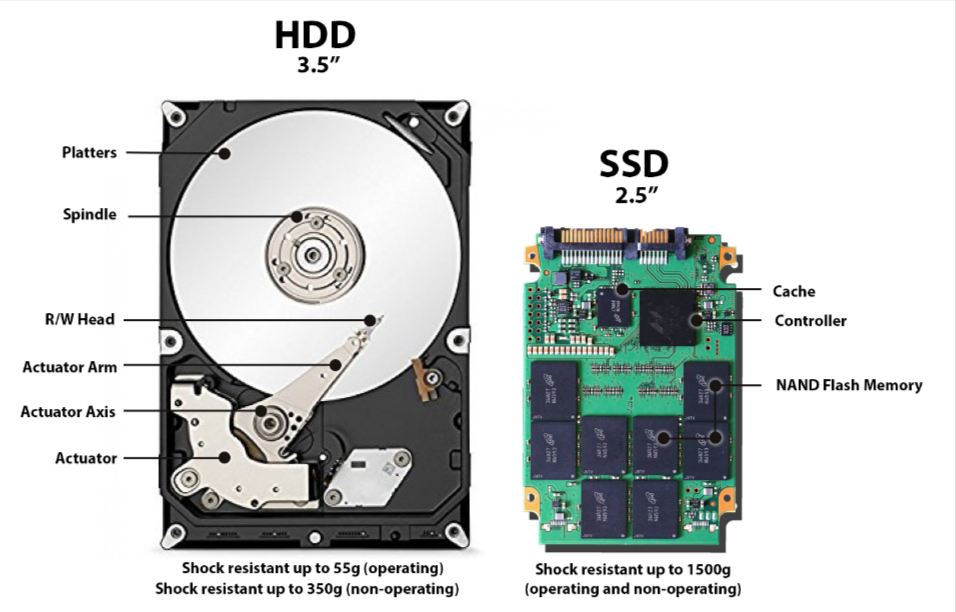
HDD is a traditional storage device with spinning platters that read and write the data. SSD is a new technology that efficiently stores data on instantly-accessible memory chips. SSDs are faster, quicker, smaller more durable, and consume less energy, while HDDs are affordable and offer more storage capacity and easier data recovery if needed.
SSDs and HDDs are both storage devices, but working is unique. The main highlight of SSD is its storage and operation. HDDs a mechanical spinning disks and a moving read/write head to operate the data, while SSDs utilize the memory chips. A price is the only barrier for the buyers that takes them back from buying the SSD. Still many are managing to buy the SSD to avail the advanced technologies. Let’s check the pros and cons of SSD in detail.
Read Also:- iCloud GU : Know all about this education management cloud system
SSD Explain:
Solid state drive SSD is the new types of disks that keep information on flash memory that includes individual memory cells storing bits that are accessible immediately by the operator. SSD speed vastly surpass those of HDDs, and the rapid data transfer will enhance the performance rapidly.
How SSD make working faster? SSDs boost the speed of system where large amount of data is stored. Below is listed processes that work better with an SSD:
- Kicks your operating system
- Established a program
- Upload a new video game level
- Unlock the big chunk of file in a resource – intensive program
- Import and export video files
- Showing the video files in editing software
When performance is highlight then it indicates the transfer of large bunches of data all the once. An SSD won’t
Example of SSD Drive:
2.5-inch SSD: The frequent type of form factor, resembling the traditional hard disk drive in size. It is mostly used in laptops and desktop computers.
M.2 SSD: A small in size, more compact form factor that is used in laptops and ultra-books. This is due to space-saving design and is available in multiple lengths and widths.
mSATA SSD: An older and smaller form factor used in older laptops and embedded systems.
Based on Interface:
- SATA SSD: It is a frequently used interface for SSDs that ensures good performance and compatibility.
- NVMe SSD: A new interface developed for SSDs that provides high speeds and lower latency.
- PCIe SSD: It connects directly to the PCIe bus, offering the best performance but it’s costly to purchase.
Based on Usage:
- Consumer SSDs: It is mostly used in laptops, desktops, and gaming consoles.
- Enterprise SSDs: It is designed for high-performance and reliability in servers and data centers.
- Industrial SSDs: It is developed to face harsh environments and extreme temperatures.
SSD Web hosting provider
It is a game changer factor for website presentation. This ensures the best working of the website by using the lightning-fast read/write speeds of SSDs. These help web hosting providers to deliver out of the way user experience in terms of website loading speed.
Key Benefits of SSD Web Hosting:
- Faster website loading speeds: Tweak the user experience and SEO rankings.
- Enhanced performance: It manages the overload traffic and resource -intensive applications working.
- Improved reliability: It helps to decrease the downtime and data loss risks.
- Better overall website responsiveness: It gives a smooth interaction for visitors.
Read Also:- Cloud techasia24.in review: What can you expect and is it reliable?
The Pros and Cons of SSDs
Pros of SSDs
- Speed: It gives maximum speed than traditional HDDs (Hard Disk Drives) in terms of reading and writing speeds. This transform the quicker boot times, faster application launches, and overall snappier system performance.
- Durability: It is resistant to shock, vibration, and physical damage. This is suitable for laptops and other portable devices.
- Quietness: Due to nonmoving parts, SSD Shared Hosting provider in USA are completely silent.
- Lower power consumption: It consists of less power than HDDs, which enhances the battery life on laptops and also reduces the power bills.
- Reduced heat generation: It produces low heat than HDDs, and grants the cooler system overall.
Cons of SSDs
- Cost per gigabyte: Before SSDs per gigabyte were costlier than HDDs, even though this gap has been removed over time.
- Limited write cycles: The modern SSDs have upgraded the write cycle endurance, they offer n number of write cycles before performance degradation takes place. However, many of the users consider this as a practical concern.
- Lower storage capacity: SSD VPS hosting provider in USA capacities has grown and it offer the maximum storage than HDDs for the same price point.
- Data recovery challenges: In case SDDs fail then recapturing the data may be the complex and costly than HDDs.
SSDs are full of various advantages in terms of speed, durability, and power efficiency. This makes SSD the best choice for the users. However, if huge storage is needed and the cost is a major concern then HDD is the suitable option.
